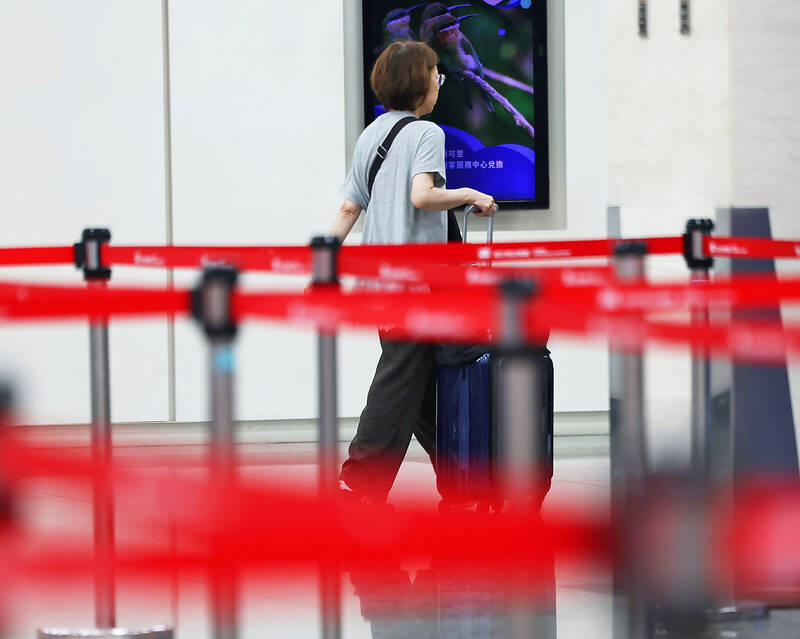The National Security Council (NSC) have established a system to evaluate the risk of a country extraditing or repatriating Taiwanese to China, a government official said yesterday.
After China last month promulgated guidelines which included the death sentence for “diehard” independence advocates, concerns were raised over whether there are countries that would cooperate with Beijing to send travelers from Taiwan to China.
The NSC has called for the Ministry of Foreign Affairs and relevant agencies to hold meetings to discuss the issue, as Taiwanese are keen to travel abroad during the summer vacation.

Photo: CNA
Minister of Foreign Affairs Lin Chia-lung (林佳龍) said there are countries likely to comply with China’s request and divided nations into five categories according to potential risk, a government official who chose to remain anonymous said.
One of the categories consists of nations that have amiable and close relations with China, especially those that uphold Beijing’s “one China” principle.
Two categories cover nations that have relevant agreements with China: The 65 nations that have signed a mutual legal assistance treaty in criminal matters, and the 17 nations that have signed an extradition treaty with China.
Another category includes the 14 nations that have extradited or repatriated Taiwanese who were accused of fraud to China.
The last category lists 17 nations that have allowed Beijing to pressure Taipei at overseas missions since January’s presidential election.
Lin also encouraged public awareness in the countries and regions frequently visited by Taiwanese, as listed by the Ministry of Transportation and Communications’ Tourism Administration.
An NSC official said that not all the nations are high risk, but Taiwanese are advised to increase awareness when visiting those that are listed in more than one category.
For example, countries that have signed an extradition or mutual legal assistance treaty with China, or support Beijing’s “one China” principle might not be democracies governed by the rule of law, and might not adhere to the principle of non-extradition of political offenders and the principle of double criminality, they said.
These countries are likely to send Taiwanese to China, against the internationally common practice that an act is only extraditable if it constitutes a crime in both the requesting and requested countries, the official said.
To avoid any unnecessary diplomatic disputes, diplomatic agencies would not name the countries that are high risk, because China might take advantage of the situation, they said.
Taiwanese can make their own judgements based on the indicators, the official said, adding that the ministry has ordered overseas missions to enhance their protection of Taiwanese visitors to ensure they are not sent to China.
Meanwhile, Deputy Minister of Foreign Affairs Hsu Szu-chien (徐斯儉) has invited 22 envoys to Taiwan to discuss how to enhance Taiwan’s international support, the official said.
The Mainland Affairs Council last month announced an “orange” travel warning for China, Hong Kong and Macau, following many Western countries’ advising people not to make unnecessary trips to China, they said, adding that South Korea also has a “orange” travel warning for China.

The Executive Yuan yesterday announced that registration for a one-time universal NT$10,000 cash handout to help people in Taiwan survive US tariffs and inflation would start on Nov. 5, with payouts available as early as Nov. 12. Who is eligible for the handout? Registered Taiwanese nationals are eligible, including those born in Taiwan before April 30 next year with a birth certificate. Non-registered nationals with residence permits, foreign permanent residents and foreign spouses of Taiwanese citizens with residence permits also qualify for the handouts. For people who meet the eligibility requirements, but passed away between yesterday and April 30 next year, surviving family members

The German city of Hamburg on Oct. 14 named a bridge “Kaohsiung-Brucke” after the Taiwanese city of Kaohsiung. The footbridge, formerly known as F566, is to the east of the Speicherstadt, the world’s largest warehouse district, and connects the Dar-es-Salaam-Platz to the Brooktorpromenade near the Port of Hamburg on the Elbe River. Timo Fischer, a Free Democratic Party member of the Hamburg-Mitte District Assembly, in May last year proposed the name change with support from members of the Social Democratic Party and the Christian Democratic Union. Kaohsiung and Hamburg in 1999 inked a sister city agreement, but despite more than a quarter-century of

Taiwanese officials are courting podcasters and influencers aligned with US President Donald Trump as they grow more worried the US leader could undermine Taiwanese interests in talks with China, people familiar with the matter said. Trump has said Taiwan would likely be on the agenda when he is expected to meet Chinese President Xi Jinping (習近平) next week in a bid to resolve persistent trade tensions. China has asked the White House to officially declare it “opposes” Taiwanese independence, Bloomberg reported last month, a concession that would mark a major diplomatic win for Beijing. President William Lai (賴清德) and his top officials

‘ONE CHINA’: A statement that Berlin decides its own China policy did not seem to sit well with Beijing, which offered only one meeting with the German official German Minister for Foreign Affairs Johann Wadephul’s trip to China has been canceled, a spokesperson for his ministry said yesterday, amid rising tensions between the two nations, including over Taiwan. Wadephul had planned to address Chinese curbs on rare earths during his visit, but his comments about Berlin deciding on the “design” of its “one China” policy ahead of the trip appear to have rankled China. Asked about Wadephul’s comments, Chinese Ministry of Foreign Affairs spokesman Guo Jiakun (郭嘉昆) said the “one China principle” has “no room for any self-definition.” In the interview published on Thursday, Wadephul said he would urge China to